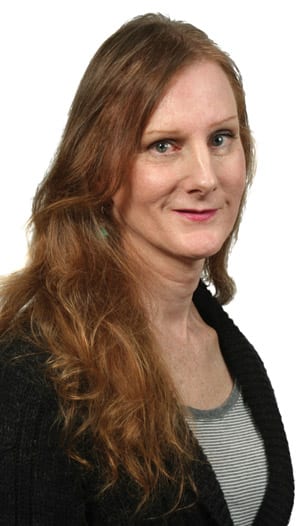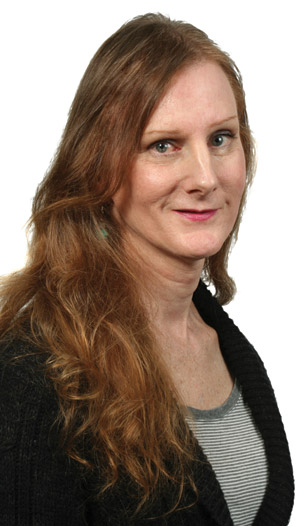Trans Pride Initiative’s Nell Gaither hopes Saturday’s breast cancer screening event at UT Southwestern will expand into annual health fair
October is a popular month for cancer screenings for women because it is Breast Cancer Awareness Month, but many masculine women and transgender people won’t undergo them because of fear of discrimination and embarrassment.
That’s why Nell Gaither, president of Trans Pride Initiative, said she planned a Chest & Breast Wellness Day at UT Southwestern Medical Center on Saturday, Oct. 20. Gaither said the event is intended for gender non-conforming individuals to have access to healthcare without feeling uncomfortable or facing discrimination at a doctor’s office.
Gaither started the nonprofit Trans Pride Initiative in August 2011 to end the disparities in trans healthcare. She then quit her job this past June to focus on the organization’s goals to end discrimination in healthcare facilities and provide better information and access to care.
“A lot of times people will avoid healthcare out of concerns for discrimination. There’s a high level of not getting healthcare in the trans and gender non-conforming communities,” she said.
“They may not be comfortable in that (traditional) setting, so it’s them being considerate of others, as well as them not wanting to be exposed to that type of situation.”
The event is the first local cancer screening day for these groups, but Gaither has worked with the transgender healthcare program at Nelson-Tebedo Clinic for about five years. While she is still active in Resource Center Dallas’ Gender Education, Advocacy & Resources Program, or GEAR, she said her nonprofit works primarily to address the healthcare needs of the community.
Gaither said there is always a sense of anxiety because of discrimination or violence from healthcare employees and other patients who overhear that someone is trans in the waiting room.
“Whenever I go to some sort of healthcare setting, you run the chance of being outed no matter what setting you’re in, especially for people whose legal names do not match their preferred names, and I’m in that case,” she said. “But I kind of want to be in that position to see what people are experiencing. I want to have to continue to experience that.”
Gaither started working with UT Southwestern in March to plan a mammogram day for the trans community and masculine women. She said the administration wasn’t interested at first, but after some personnel changes, the new person she was put in contact with was on board immediately.
The event progressed into a full day of chest exams in October because it is Breast Cancer Awareness Month. Gaither said she wants to expand the day to an annual health fair at UT Southwestern for other areas and exams like pap tests and pelvic exams.
Screening costs at the event are covered for Dallas and Tarrant County residents if someone’s insurance won’t cover the cost or if someone doesn’t have insurance. Residents of other counties should call first, she said.
Dr. Oliver Blumer, who is the vice chairman of the Transgender Education Network of Texas, or TENT, said data released this week shows that Texas transgender people face more discrimination than national numbers. The study was conducted by the National Gay and Lesbian Task Force and the National Center for Transgender Equality, but TENT and Equality Texas broke down the statewide numbers for Texas.
Among the study’s findings, 19 percent nationally and 16 percent in Texas reported being denied healthcare because of their gender identity. Both nationally and in Texas, 19 percent postponed medical care because of discrimination.
Blumer said aside from discrimination, many transgender people avoid healthcare because they are uncomfortable going to a doctor for routine exams because their anatomy doesn’t match their gender identity.
But Blumer cautioned the trans community against shying away from healthcare. He said hormone therapy and family history of breast cancer can affect men who have transitioned to women.
And female-to-male transgender people are at risk because even if they’ve had their breasts removed, their chromosomes can still carry genes that make them vulnerable.
He said many trans people don’t have primary care physicians for wellness treatment, which is why events that target helping the trans community are so important because they provide training to doctors, make them aware of how to use pronouns and help members of the community feel more confident receiving medical care.
“Being a male in a women’s waiting room to get a breast exam is scary,” he said, adding that a smaller waiting room on a Saturday will prevent some of the anxiety. “This setting will help them feel more at ease.”
Liz James, executive director of the Lesbian Health Initiative of Houston Inc., has been working with her organization for years to eliminate healthcare barriers for LGBT women. Over the last year, she said the organization has helped trans men gain access to healthcare and advocacy programs.
James said the largest problem she faces is people who are uninsured, and LGBT people are twice as likely to be uninsured. So she started partnering with hospitals several years ago for cancer screenings and other vital tests for women.
“All of these barriers prevent people from going to the doctor and they end up in care when they’re symptomatic,” James said.
In the last few years, the organization has started two multi-provider clinics a year in the Houston area, teaming up with several hospitals to provide a variety of exams and screenings.
James said the event at UT Southwestern is certainly just the beginning of Gaither’s future success with accessible healthcare options for the North Texas LGBT community.
“Nell is identifying those barriers and eliminating them,” James said. “By doing that, you create cultural competency for our community.”
Gaither said the timeline for a health fair is still uncertain, but she wants to work closely with UT Southwestern to make it a reality in the future. She also said she wants to work with the medical university to have transgender and LGBT issues taught, ending a lack of awareness about health needs for LGBT people.
“I feel like we are actually making a difference,” she said. “We’re really hoping that this brings a lot more attention to the disparities, so we really hope this is the beginning of something fairly big and fairly long-term.”
Chest & Breast Wellness Day
The event is from 7:30 a.m. to noon Saturday, Oct. 20, at UT Southwestern Medical Center, 2201 Inwood Road on the third floor. Screenings will remain open until 5 p.m. if there are enough appointments or people waiting. Appointments can be made by calling 214-645-2526, but walk-ins will also be accepted.
………………………………………….
This article appeared in the Dallas Voice print edition October 19, 2012.



